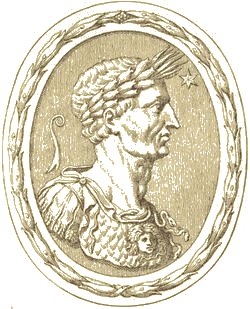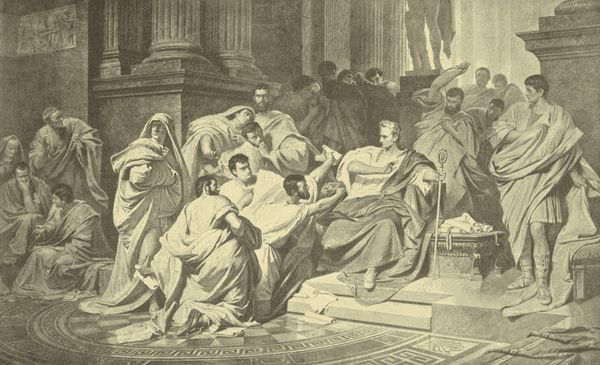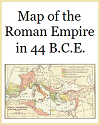 |
| Julius Caesar (100-44 B.C.E.) |
|---|
| www.studenthandouts.com > Historical Figures > "C" Name Historical Figures > Julius Caesar |
|---|
Gaius Julius Caesar was a prominent Roman general, statesman, and dictator who lived in the 1st century BCE. He is one of the most well-known figures in Roman history and played a pivotal role in the transformation of the Roman Republic into the Roman Empire.
 Early Life: Julius Caesar was born in 100 BCE into the prestigious patrician Julian clan in Rome. He came from a politically influential family, which provided him with opportunities in Roman politics and the military.
Early Life: Julius Caesar was born in 100 BCE into the prestigious patrician Julian clan in Rome. He came from a politically influential family, which provided him with opportunities in Roman politics and the military. Military Career: Caesar pursued a military career and demonstrated his leadership abilities in various campaigns. He served in Asia, Spain, and Gaul, where he conducted a series of successful campaigns that expanded Roman territory. First Triumvirate: In 60 BCE, Julius Caesar formed the First Triumvirate, a political alliance with two other influential Romans, Pompey and Crassus. This alliance allowed Caesar to consolidate power and advance his political career.  Conquest of Gaul: Caesar's most famous military achievement was the conquest of Gaul (modern-day France) from 58 BCE to 50 BCE. His campaigns in Gaul were highly successful and brought him immense wealth, popularity, and a loyal army.
Conquest of Gaul: Caesar's most famous military achievement was the conquest of Gaul (modern-day France) from 58 BCE to 50 BCE. His campaigns in Gaul were highly successful and brought him immense wealth, popularity, and a loyal army. Conflict with the Senate: As Caesar's power and influence grew, tensions with the Roman Senate increased. The Senate saw him as a threat to the traditional Roman Republic, and this conflict eventually led to civil war. Civil War: In 49 BCE, Caesar crossed the Rubicon River with his army, a move that violated Roman law. This action marked the beginning of a civil war against his political rival, Pompey. Caesar emerged victorious and established himself as the de facto ruler of Rome. Dictatorship: In the years that followed, Julius Caesar held the titles of consul, dictator, and dictator perpetuo (dictator in perpetuity). He implemented various reforms, including a new calendar system known as the Julian calendar, which laid the foundation for the modern Gregorian calendar.  Assassination: On the Ides of March (March 15), 44 BCE, Julius Caesar was assassinated by a group of Roman senators, including Brutus and Cassius. This event is famously recounted (though fictionalized) by William Shakespeare in his play Julius Caesar.
Assassination: On the Ides of March (March 15), 44 BCE, Julius Caesar was assassinated by a group of Roman senators, including Brutus and Cassius. This event is famously recounted (though fictionalized) by William Shakespeare in his play Julius Caesar. Legacy: Caesar's assassination led to further political turmoil in Rome, including the formation of the Second Triumvirate, which included Octavian (Augustus), Mark Antony, and Lepidus. The civil wars that followed eventually resulted in the establishment of the Roman Empire. Name and Title: The title Caesar became synonymous with emperor, and it was adopted by later Roman emperors. Julius Caesar's name is also the origin of the word czar or tsar, used for Russian emperors, as well as of Kaiser, for German rulers.. Julius Caesar's life and career had a profound impact on the course of Roman history. His rise to power, military conquests, and reforms marked a significant turning point in the transition from the Roman Republic to the Roman Empire. |
 |  |  | ||||||||
| Julius Caesar (100-44 B.C.E.) Biography Workbook | Bust of Julius Caesar | Roman Empire Map of 44 B.C.E. at the Death of Julius Caesar |
| Ancient Rome Books and Films | Ancient Rome Outlines and PowerPoints |
| Ancient Rome Maps and Pictures | Ancient Rome Study Games |
| Ancient Rome Miscellany | Ancient Rome Worksheets |
| www.studenthandouts.com > Historical Figures > "C" Name Historical Figures > Julius Caesar |
|---|






